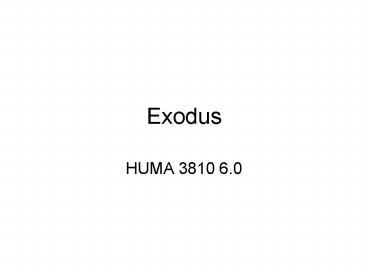Exodus - PowerPoint PPT Presentation
1 / 10
Title:
Exodus
Description:
covenant at Mount Sinai. formation of people w/ belief in God under ... major economic interest in sheep, oxen, asses. rural agrarian society (11th cent. BCE) ... – PowerPoint PPT presentation
Number of Views:46
Avg rating:3.0/5.0
Title: Exodus
1
Exodus
- HUMA 3810 6.0
2
Exodus as central book of Hebrew Bible
- Gods great act in history (exodus)
- ? covenant at Mount Sinai
- formation of people w/ belief in God under
leadership of Moses - exodus as central historical ethical
event/theme in Isr. consciousness
3
Search for historicity of story
- has yielded no results
- miracles cannot be proven empirically
- no mention of Moses or exodus in ancient
extra-biblical sources - Ramses II as one of most powerful pharaohs
- story vague, where details ? impossible
(Kadesh-Barnea) - 600,000 men of fighting age ? ca 2.5 3 million
total!?
4
Exodus as foundational narrative
- last week ancestor stories reflective of ethnic
self-understanding - Israel composed of disparate elements developed a
common heritage by means of historical fiction
(cf. Canada/USA) - power of story echoed in Jewish custom at
Passover meal to have everyone view him/herself
as personally redeemed and at covenant ceremony - possible that small group did have memory of
oppression in Eg. no more can be said - exodus as metaphor Jeroboam vs. Solomon Canaan
vs. Egypt at end of LBA house of Saul vs. David
(Sperling)
5
Important Themes/Subjects/Passages
- Influence of women in Moses early life
- midwives
- mother sister
- daughter of Pharaoh
- Zipporah (bridegroom of blood in Exod 424-26)
- Midian and the worship of Yahweh
- Jethro as priest of Midian
- evidence of Yahweh worship in general region
(Yahu) - biblical traditions that Yahweh came from the
south (Judg 54-6 Isa 631ff.) - Origin of name of Yahweh (Exod 3 burning bush,
ehyeh etc.) - Ten Plagues (9 natural 1 supernatural) Origin
of Passover (Exod 12-13) - Battle against Pharaoh pits one god against
another - What happened at the Reed Sea?
- Exod 1412-21 1519 ? walls of water wheels
getting stuck - Exod 15 seems to imply pursuit on boats
drowning (no chariots)
6
The Covenant at Mount Sinai/ The Sinaitic
Covenant
- stages in development of covenant
- w/ ancestors ? unconditional promises
- Sinaitic ? conditional covenant (formal treaty w/
obligations ? berît)
7
ANE treaties essential in understanding the
concept of covenant in HB
- known from Hittite empire (1450-1200), Sefire
(8th c.), VTE (681-669) - parity treaty (btwn brothers)
- suzerainty/vassal treaty (father/son)
- vassal owes sole allegiance to suzerain
- treaty form
- preamble/identification (Exod 202a)
- historical prologue (basis for covenant Exod
202b) - stipulations (commandments Exod 203-14)
- deposit (Exod 2516)
- witnesses (247//Josh 2422 periodic reading
Deut 3110-13) - blessings curses (Lev 26 Deut 28)
8
Some distinctive (?) characteristics of Israelite
covenant concept
- btwn. divine humans, not humans humans
- source of law divine, not human
- Moses as lawgiver, not lawmaker
- contrast w/ Hammurabi
- stipulations not timebound to specific historical
circumstances - prohibition of idolatry ? transcendent God
9
Israelite Law
- based on ANE legal traditions (Urnammu ca. 2100,
Lipit-Ishtar ca. 1900, Eshnunna ca. 1850,
Hammurabi ca. 1775, Hittite Laws as of 1600,
Middle Assyrian 12th cent.) - not law codes in modern (Roman) sense
- collections of law ? literary compositions
- the question of precedent law
10
(Book of the) Covenant (Code) Exod 211-2319
- casuistic (211-2216) and apodictic
(2217-2319) law A. Alt - casuistic case law amendments (home in law
codes) - apodictic moral standards (home in treaty
texts) some mixing - laws to be dated to pre-monarchic period
- no mention of apparatus of city-state or monarchy
- major economic interest in sheep, oxen, asses
- ? rural agrarian society (11th cent. BCE)
- some features of Covenant Code compared w/
Hammurabi - sanctity of human life vs. sanctity of property
- goring ox Exod 2128-32 CH 250-252
- theft Exod 2137-223 CH 8 22
- no vicarious punishment/talion in Exod vs. CH
229-230 - less social stratification (except for slaves)
- d) moral underpinning for you were
slaves/strangers in Egypt (Exod 2220-23 239)






























